Pills, Power, and Policy by Dominique A. Tobbell

Author:Dominique A. Tobbell
Language: eng
Format: epub
Publisher: University of California Press
Published: 2012-01-23T00:00:00+00:00
The Therapeutic Consultants Program and the Effort to Create Expert Educators
In October 1964, the DRB created the Committee on Continuing Education. Chaired by Carl F. Schmidt, the research director of the U.S. Naval Air Development Center and a former professor of pharmacology at the University of Pennsylvania School of Medicine, the committee was charged with exploring what the DRBâs role should be in expanding and improving physiciansâ access to pharmaceutical information. The committee was particularly troubled that medical schools were systematically reducing and in some cases discontinuing the teaching of therapeutics within the medical school curriculum just when that instruction was needed most. Therapeutics refers specifically to the practice of treating disease. Amid the rapid pace of pharmaceutical innovation, physicians were struggling to keep abreast of the latest developments in therapeutic practice. Without sufficient training in therapeutics and without access to accurate and reliable sources of pharmaceutical information, it was no wonder, the committee held, that physicians relied on the pharmaceutical industry for their information.
Despite the intellectual relationship of therapeutics to clinical pharmacology (which referred to the study of drug actions in humans and not to practice), the DRB realized that increasing the number of clinical pharmacologists and the amount of clinical pharmacology being taught to medical students would not be sufficient to provide all physicians with authoritative information on how to incorporate the wealth of new drugs into practice. Rather, what the nationâs practicing physicians needed was access to accurate, up-to-date, and regularly available continuing pharmaceutical education.
Within eighteen months, the Committee on Continuing Education had determined that all existing methods of disseminating drug information to physiciansâwhether newsletters, workshops and conferences, or editorialsâoffered little hope of competing with the methods of pharmaceutical detailing. Acknowledging the âsuccess of the face to face approach,â the committee instead resolved to tackle the drug information problem by establishing an education program modeled on the work of pharmaceutical sales representatives.
To this end, the committee proposed a therapeutic consultants program in which medical schools (ten to begin with) would hire an academic physician or pharmacologist with expertise in therapeutics to serve on a full-time basis at the medical school. This therapeutic consultant would be responsible for bringing to physicians in the region âa wide range of authoritative information on the uses and limitations of new drugs.â86 The therapeutic consultantsâ educational efforts would be two-pronged. First, therapeutic consultants would offer regular seminars and workshops on specific aspects of pharmaceutical practice, which would be available to all physicians in the region. In this way, the work of the therapeutic consultants was to be modeled on the work of medical schoolsâ existing continuing medical education programs. Second, therapeutic consultants would visit physicians in their offices and clinics, providing them with up-to-date and face-to-face information on prescription drugs. This, the most innovative aspect of the therapeutic consultants program, was modeled on the work of pharmaceutical detail men and the farmer education provided by statesâ agricultural extension officers.
To ensure their continued access to high-quality and authoritative drug information and preserve their
Download
This site does not store any files on its server. We only index and link to content provided by other sites. Please contact the content providers to delete copyright contents if any and email us, we'll remove relevant links or contents immediately.
Harry Potter and the Goblet Of Fire by J.K. Rowling(3045)
Never by Ken Follett(2880)
Shadow of Night by Deborah Harkness(2718)
Ogilvy on Advertising by David Ogilvy(2682)
Zero to IPO: Over $1 Trillion of Actionable Advice from the World's Most Successful Entrepreneurs by Frederic Kerrest(2394)
The Man Who Died Twice by Richard Osman(2299)
Machine Learning at Scale with H2O by Gregory Keys | David Whiting(2291)
Book of Life by Deborah Harkness(2263)
How Proust Can Change Your Life by Alain De Botton(2261)
My Brilliant Friend by Elena Ferrante(2223)
0041152001443424520 .pdf by Unknown(2220)
The Tipping Point by Malcolm Gladwell(2204)
How to Pay Zero Taxes, 2018 by Jeff A. Schnepper(2099)
Will by Will Smith(2041)
Purple Hibiscus by Chimamanda Ngozi Adichie(1981)
Hooked: A Dark, Contemporary Romance (Never After Series) by Emily McIntire(1959)
Borders by unknow(1785)
Rationality by Steven Pinker(1765)
Daughter of Smoke and Bone by Laini Taylor(1744)
